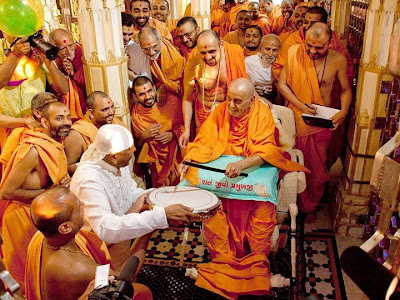BAPS Youth
Jay Swaminarayan
Saturday, 14 September 2013
Sunday, 7 October 2012
Swaminarayan Akshardham, Delhi, India
: BAPS SWAMINARAYAN AKSHARDHAM :
Height: 141.3 ft
Width: 316 ft
Length: 356 ft
Inauguration: 6-11-2005, Kartik Shukla Panchmi, Labh Pancham, V.S. 2062
Organizer: BAPS Swaminarayan Sanstha.Creator: HDH Pramukh Swami Maharaj.
Width: 316 ft
Length: 356 ft
Inauguration: 6-11-2005, Kartik Shukla Panchmi, Labh Pancham, V.S. 2062
Organizer: BAPS Swaminarayan Sanstha.Creator: HDH Pramukh Swami Maharaj.
The beautiful mandir built without steel, consists of 234 ornately carved pillars, 9 ornate domes, 20 quadrangled shikhars, a spectacular Gajendra Pith (plinth of stone elephants) and 20,000 murtis and statues of India’s great sadhus, devotees, acharyas and divine personalities.
The mandir is a fusion of pink stone and pure white marble, where pink stone symbolizes bhakti in eternal bloom and white marble that of absolute purity and eternal peace. Akshardham was created by HDH Pramukh Swami Maharaj in fulfillment to the wish of his guru, Brahmaswarup Yogiji Maharaj, the fourth successor in the spiritual hierarchy of Bhagwan Swaminarayan. In only a short timespan of five years Swaminarayan Akshardham became a reality through the blessings of Pramukh Swami Maharaj, 300 million man hours of epic services rendered by 11,000 volunteers, sadhus and artisans and the immense sacrifice, austerities, prayers of hundreds of thousands of young and old devotees of BAPS Swaminarayan Sanstha.
The grand, ancient-styled Swaminarayan Akshardham complex was built in only five years through the blessings of HDH Pramukh Swami Maharaj of the Bochasanwasi Shri Akshar Purushottam Swaminarayan Sanstha (BAPS) and the colossal devotional efforts of 11,000 artisans and BAPS volunteers. The complex was inaugurated on 6 November, 2005.
Akshardham means the eternal, divine abode of the supreme God, the abode of eternal values and virtues of Akshar as defined in the Vedas and Upanishads where divine bhakti, purity and peace forever pervades.
For the first time ever in the world witness the heritage of India in all its facets, insights and beauty at the Swaminarayan Akshardham through its mandir, exhibitions, verdant gardens and other attractions.
As you might know, almost all followers of Hinduism live in India, and no wonder the world's largest Hindu temple is situated in the capital of India.
Speaking of Delhi landmarks, one would traditionally mention Red Fort, Qutub Minar, and India Gate on Kingsway. So how come Swaminarayan Akshardham (which means "temple of the God"), a magnificent and beautiful temple, is not so famous? The answer is simple: it is very "young".
It was opened in 2005. The construction took over 5 years and involved 7 thousand artisans and 3 thousand construction workers from all over India. Their combined efforts gave birth to a building 42 meters high, 94 meters wide, and 106 meters long. The structure of Akshardham consists of 234 pillars, 9 shiny domes, 20 four-sided towers, and over 20 thousand figurines depicting themes from Indian mythology. There are over 148 statues of an elephant alone!
All the facing was done by hand. Outer surface of the temple is faced with pink sandstone, while the inner surface is faced with white marble. In India, pink color symbolizes love for God, and white color symbolizes absolute purity and peace.
Thanks to its enormous size the temple is included in the Guinness Book of World Records. The temple complex takes up 12 hectares of land and includes the temple itself, several parks, a museum, a large cultural center where one can learn about Indian traditions and customs, water canals, which you can traverse by boats, and lots of cafes and souvenir shops.
Every evening there is a laser show with dancing fountains on Swaminarayan Akshardham grounds. The fountains are built in the form of a lotus placed inside a large bowl-shaped basin. The inner side of the basin serves as steps and benches for thousands of viewers.
Construction of this beautiful site was funded by donations and done through a spirit of volunterism. In order to fill in all man-made lakes and canals surrounding the temple required huge supply of water from 151 ponds around the country. In a country, where clean water is as precious as gold, it was quite a generous donation as well.
JAY SWAMINARAYAN
FROM : RAHUL J. PATEL ( ... rahulmansa.patel@gmail.com... !
Sunday, 9 September 2012
Saturday, 25 August 2012
Subscribe to:
Comments (Atom)





































































































